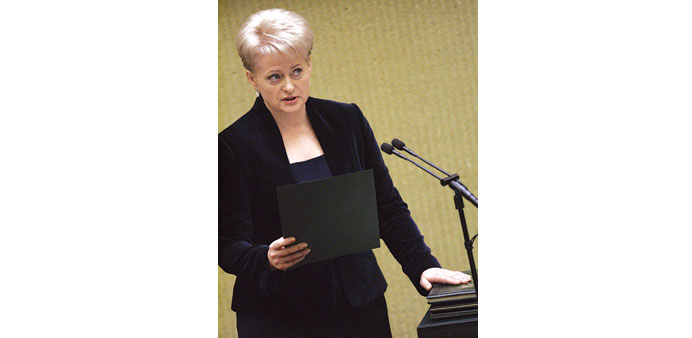Reuters
The European Union threatened Russia yesterday with harsher sanctions over Ukraine, but failed to back tough talk with any immediate action after France’s president signalled that the disputed delivery of a warship to Moscow would go ahead.
The 28 EU ministers met under pressure from the United States and Britain to step up sanctions after the downing of a Malaysian Airlines plane last week in an area of eastern Ukraine controlled by Russian-backed separatists.
Dutch Prime Minister Mark Rutte, speaking in Amsterdam, said that attitudes towards Russia had changed “fundamentally” since the disaster, and the EU must put pressure on Moscow to do more to calm the unrest in eastern Ukraine.
The ministers did agree to widen the list of individuals and entities targeted by asset freezes and visa bans, and to draft possible additional sanctions on access to financial services and technology, including in the energy sector, if Russia does not co-operate with an international investigation into the disaster and act to calm the separatists.
But they took no immediate additional measures and differences persisted over taking firmer steps against Europe’s leading energy supplier.
The president of the former Soviet republic of Lithuania, now an EU member, accused France of pursuing a policy akin to the 1930s appeasement of Nazi Germany over its decision to go ahead with the delivery of a helicopter carrier to Moscow.
EU envoys will discuss the wider target list for existing sanctions tomorrow, Dutch Foreign Minister Frans Timmermans.
The ministers asked the executive European Commission to draw up more far-reaching sanctions on access to capital markets and high-tech but any such measures would be conditional on approval by EU leaders and not immediate, diplomats said.
Goods embargoed could include military, energy and dual-use technologies.
Timmermans opened the meeting after a minute’s silence was held in memory of the 298 people – 193 of them Dutch – who died when flight MH17 crashed on Thursday en route from Amsterdam to Kuala Lumpur.
Several ministers called for an arms embargo on Russia to try to stem a flow of weapons that is fuelling the conflict, including surface-to-air missiles suspected of bringing down the airliner.
Washington says the plane was brought down by a surface-to-air missile fired from territory in eastern Ukraine held by pro-Russian separatists. Moscow denies involvement.
US President Barack Obama has piled pressure on Europe for a more forceful response, and the three leading EU powers – Britain, France and Germany – said that they should be ready to ratchet up sanctions.
But there was no sign of consensus, with many governments concerned to protect crucial Russian energy supplies and business ties with Moscow.
Differences between Britain and France burst into the open on Monday when President Francois Hollande said delivery of a first French helicopter carrier built for Russia would go ahead, hours after British Prime Minister David Cameron had said such a delivery would be “unthinkable” in his country.
Hollande said the handover of a second Mistral-class warship under a €1.2bn ($1.62bn) contract signed in 2011 by his predecessor would depend on Russia’s attitude. “We’ll see if the Russians behave badly,” he said.
Hollande won support among both his own Socialists and the conservative opposition UMP for standing up to outside pressure. Socialist Party leader Jean-Christophe Cambadelis said Cameron should “start by cleaning up his own backyard”, referring to the presence of Russian oligarchs close to Putin in London.
Cameron’s spokesman said Britain was ready to consider sanctions that would affect its own interests, notably in financial services.
But when asked about the prime minister’s comment that it was time to target “cronies and oligarchs” around Putin, the spokesman said he had seen little evidence that London-based Russian tycoons were involved in supporting the Ukraine rebels.
Lithuanian President Dalia Grybauskaite, an outspoken critic of Putin, compared the French attitude to the appeasement of Nazi Germany in the 1930s.
“If European states keep on acting so indecisively, this is a direct invitation for the aggressor to be more aggressive and go further,” she told LRT public radio. “In 1930s Nazism wasn’t stopped, and now aggressive Russian chauvinism isn’t stopped and that resulted in the attack against a civilian plane.”
“All European states must understand that after such brutal aggression against the plane we have to stop the Mistralisation of our politics,” she said in a play on the warship’s class.
Timmermans said the Netherlands, which until now has been hesitant about imposing tougher measures on Moscow, was not opposed to further sanctions.
“There is no Dutch blockade of further sanctions. The Netherlands wants that the European Union makes a united, and also strong, clear, statement against the unrest in eastern Ukraine,” he told reporters.
Any decision to move to tough economic sanctions, including restricting access to capital markets, would require a summit of EU leaders, diplomats said.
The next summit is not due until August 30 although a meeting of heads of state and government could be convened earlier if there is agreement.

